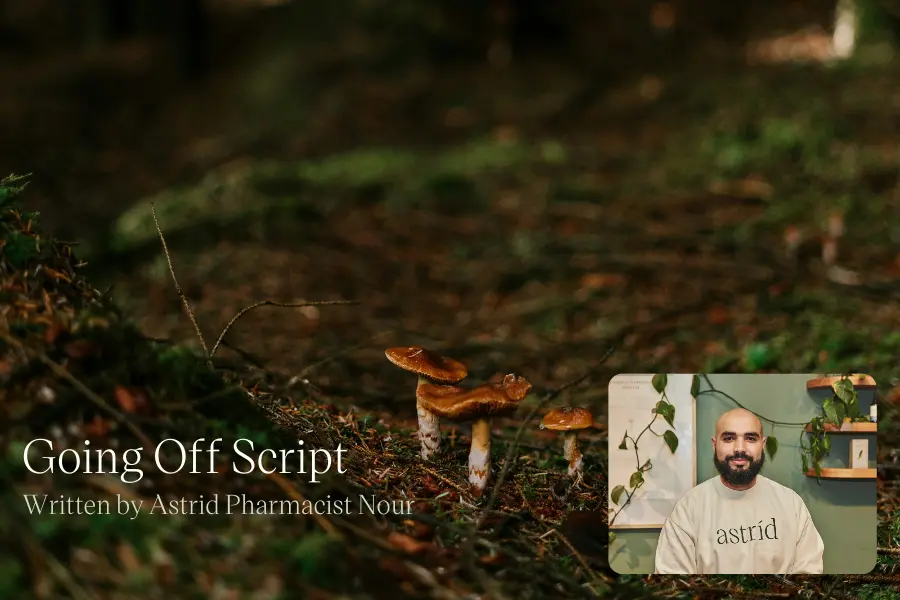Psilocybin, if you are not already familiar, is the active ingredient in magic mushrooms, which elicits powerful hallucinogenic effects when ingested.
The potential of psychedelics in medicine was recognised early on, and despite being made illegal, research persisted to give us the breakthroughs we have today. The reason I bring this up, is not to talk about psychedelics, but rather to highlight the fact that an unsuspecting little mushroom can have such an immense impact on the brain’s neurochemistry. It leads one to consider, what about all the other fantastic fungi being foraged in the forests?
A variety of different mushroom species have been used in traditional Eastern medicine for millennia, and extracts of the turkey tail mushroom have been used in mainstream cancer treatments in Japan since the 1970s. So it is no surprise that so-called medicinal mushroom extracts have been all the rage in alternative medicine circles, and that there is currently a booming global mushroom supplement market, enough to rival even Super Mario’s mushroom kingdom. Like any other trend in the wellness world, it is imperative for those of us in healthcare to have a look at the science before recommending anything with confidence.
As it turns out, there has been a variety of research into mushroom extracts with varying results, and we have done our best to summarise these findings for some of the more common mushroom species on the market.
Turkey tail has been widely studied, and research in humans and animals shows that one of its components, polysaccharide-K, may stimulate the immune system. In clinical trials, turkey tail supplements seemed to improve survival for people with colon and gastric cancer.
A number of other clinical trials showed that the compound, lentinan, derived from shiitake mushrooms, may extend survival in patients with, prostate, stomach, liver and colorectal cancers when combined with chemotherapy. Both these compounds are approved in Japan as an addition to the mainstream treatments for treating cancer.
Clinical trials of lion’s mane extracts showed improved cognitive test scores in elderly people with mild cognitive impairment, and benefits for those with mild Alzheimer’s disease. It is important to note however that these trials had less than 20 participants and involved researchers working for mushroom supplement companies.
Reishi mushrooms are another common variety of fungi that have been used historically for a variety of ailments. A number of human trials with reishi have found benefits for patients with type 2 diabetes, high blood pressure, heart disease, and cancer. Again the findings, while promising, are still lacking the level of evidence required to make a solid conclusion for the effectiveness of these supplements.
In mouse studies, some research has found that Chaga mushroom extract may help with learning and memory, reducing inflammation, increasing exercise endurance and lowering blood sugar—although, there is very little supporting information about these effects in humans.
Cordyceps mushrooms, made famous in the video game and TV series, The Last of Us, for turning humans into zombies, have been reported to work as an anti-depressant (amongst other things) however, none of the claims have any adequate supporting clinical trials.
As is evident from the ongoing studies, we still have a long way to go before we can effectively use medicinal mushroom extracts in a proper clinical setting—but the research certainly shows a lot of potential benefits.
Modern medicine is based generally on a single-molecule approach, where a single compound is identified, extracted, and used to treat an illness. We can assess a method of action, adjust doses according to response, and figure out a therapeutic dosing regimen.
Mushrooms and their extracts contain hundreds of different compounds and depending on how they have been cultivated, different batches may have differing amounts of certain chemicals and thus inconsistent effects. Therefore, it is important to take a lot of the embellished claims made by these manufacturers with a grain of salt.
Relative to many other alternative medicine products, the information we do have for medicinal mushrooms is generally quite impressive. We cannot forget that there are antibiotics and cholesterol-lowering medications that we use daily that were originally derived from fungus, and perhaps with more clinical research we can unlock more medical magic from these mushrooms.
If you are not allergic to mushrooms, and are looking for supplements with a bit more information behind them, then talk to your pharmacist or book in with our Naturopath to discuss medicinal mushroom extracts and whether they may be suitable for you.
References:
Mushroom magic: why the latest health fad might be on to something
Teresa Carr, The Guardian, Thu 17 Jan 2019
Functional fungi: can medicinal mushrooms really improve people’s health?
Nic Fleming, The Guardian, Mon 30 Oct 2023
Int J Mol Sci. 2021 Jan 10;22(2):634. doi: 10.3390/ijms22020634
Medicinal Mushrooms: Bioactive Compounds, Use, and Clinical Trials
Giuseppe Venturella 1,*, Valeria Ferraro 1, Fortunato Cirlincione 1, Maria Letizia Gargano 2
